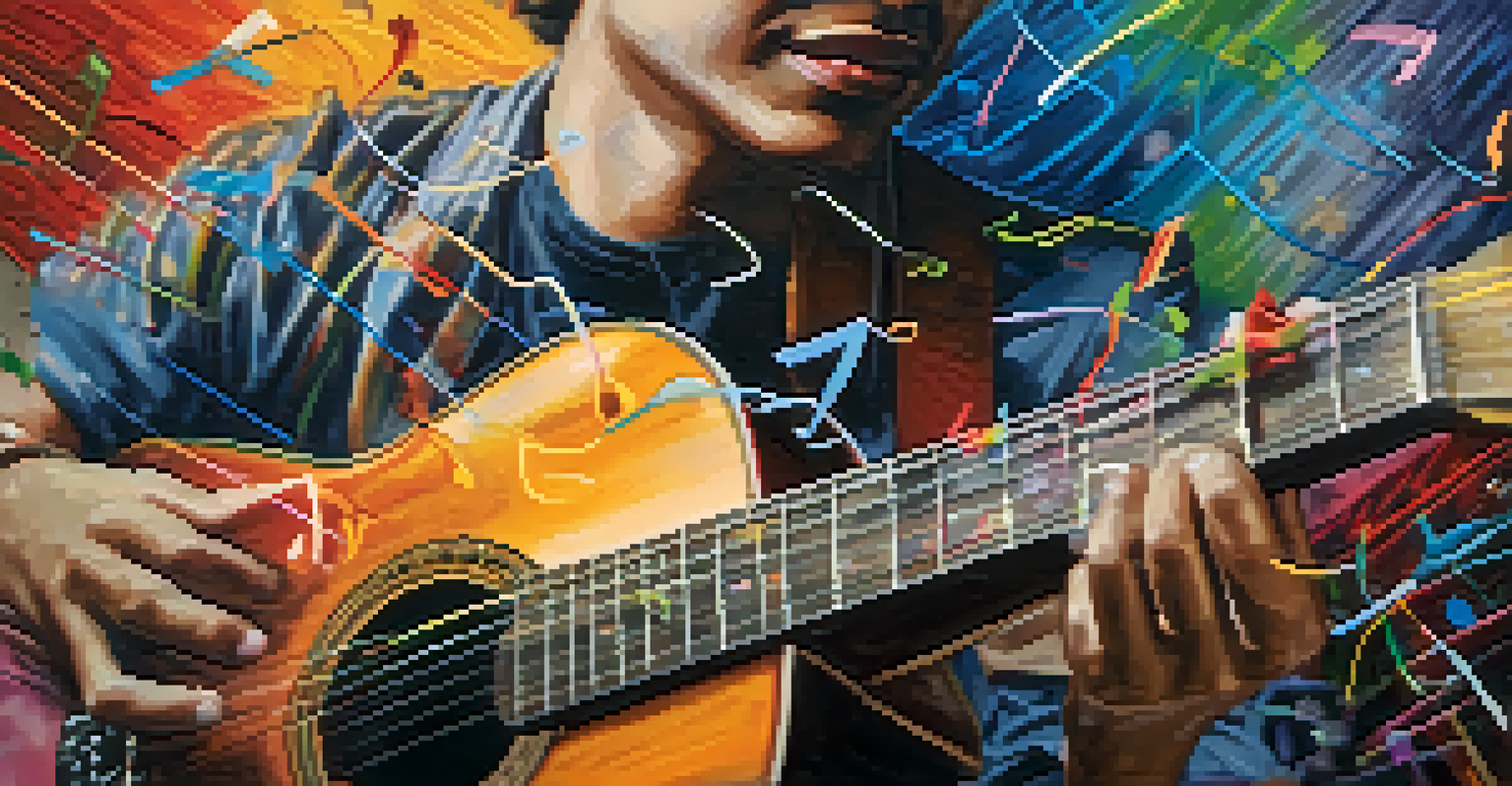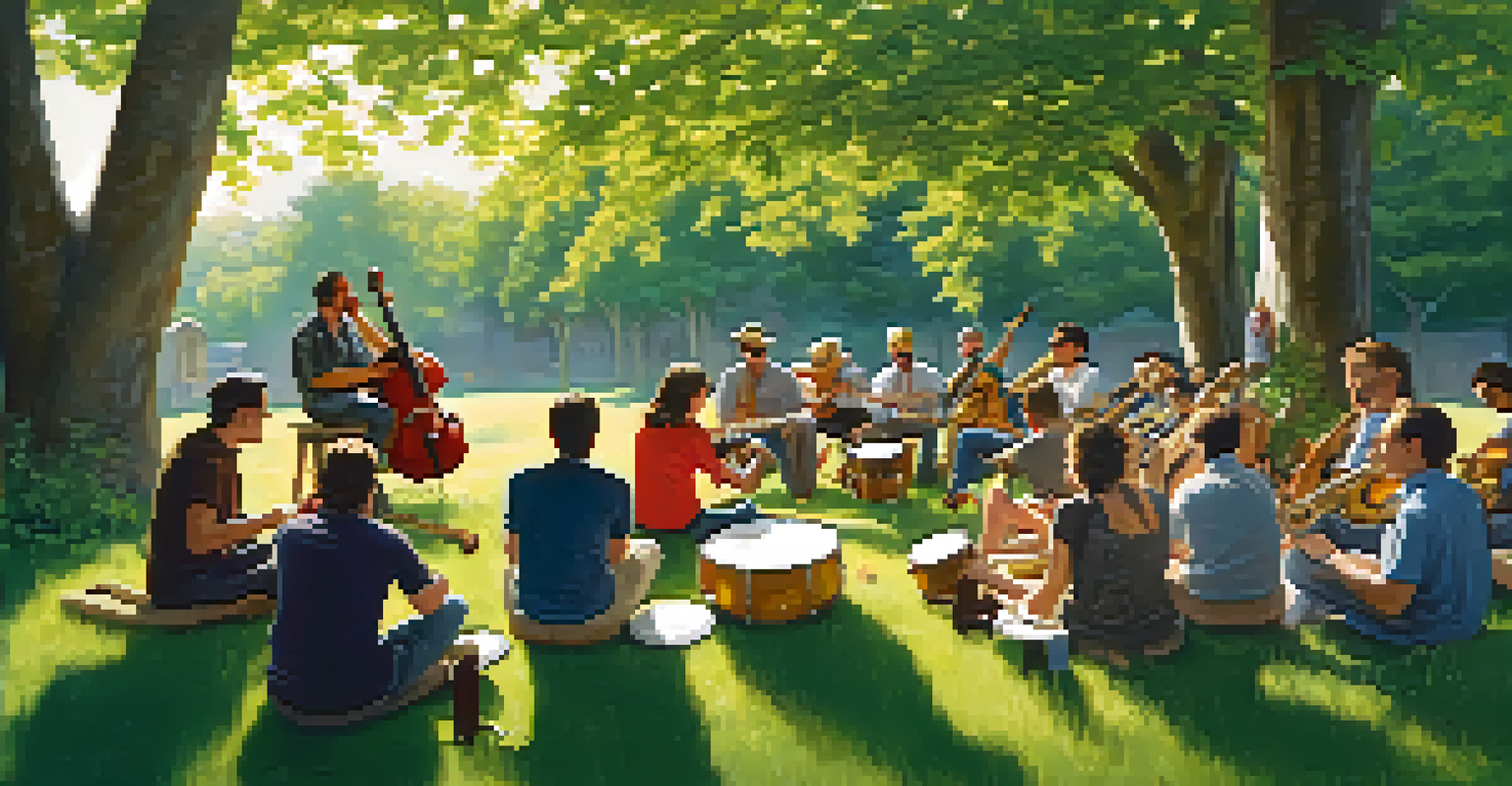Best Practices for Collaborating on Guitar Platforms Online

Choose the Right Platform for Your Needs
When it comes to collaborating on guitar platforms, selecting the right one is crucial. Options like Soundtrap, BandLab, and Kompoz each have their unique features that cater to different collaboration styles. For instance, Soundtrap offers real-time collaborative features, making it great for live jamming sessions, while BandLab excels in community engagement. Take the time to assess what you need before diving in.
Alone we can do so little; together we can do so much.
Another factor to consider is the user interface and accessibility of the platform. A straightforward, intuitive design can significantly enhance the collaborative experience, allowing you to focus more on music creation and less on navigating complex menus. Think about who you’ll be collaborating with as well; ensure everyone is comfortable with the chosen platform to avoid any hiccups.
Finally, don't forget to check if the platform supports the tools you need, like audio editing options or built-in effects. Some platforms offer mobile apps, which can be a game-changer for musicians on the go. By choosing the right platform, you set the stage for a successful collaboration.
Establish Clear Communication Channels
Effective collaboration hinges on clear communication. Whether you’re sharing ideas, providing feedback, or discussing arrangements, having designated channels can streamline the process. Tools like Slack or Discord can help facilitate real-time chats, while platforms like Trello can keep track of tasks and deadlines. Consider what works best for your group and set it up from the start.

Additionally, be mindful of time zones and schedules when working with collaborators from different regions. Setting a regular check-in time can help ensure everyone is on the same page and reduce misunderstandings. This routine can also cultivate a sense of camaraderie, making the collaboration more enjoyable.
Choose the Right Collaboration Platform
Selecting a platform like Soundtrap or BandLab can significantly enhance your music collaboration experience by catering to different needs.
Remember to encourage open dialogue and be receptive to feedback, as this fosters a positive environment. Constructive criticism can elevate your music, so approach each other's ideas with kindness and respect. By nurturing a collaborative spirit, you'll find that communication becomes more fluid and effective.
Set Goals and Deadlines Together
Setting goals can significantly enhance the productivity of your collaboration. Discuss what you wish to achieve, whether it’s completing a song, creating a music video, or even preparing for a virtual gig. Establishing a clear vision will help align everyone’s efforts and keep the project on track. It’s akin to plotting a map for a road trip—you’ll all know where you’re headed.
Collaboration allows us to know more than we are capable of knowing by ourselves.
Along with goals, it’s essential to set realistic deadlines. Having a timeline not only motivates you to stay focused but also allows everyone to manage their time effectively. Consider creating milestones to celebrate small wins along the way, as this can boost morale and keep enthusiasm high.
Moreover, be flexible with your goals and deadlines. Sometimes creativity doesn’t follow a strict schedule, and that’s okay! Open discussions about any adjustments needed can help maintain momentum while respecting everyone’s creative process.
Share Resources and Inspiration Freely
Collaboration thrives on the sharing of resources and inspiration. Whether it’s chord charts, backing tracks, or articles about music theory, providing access to these materials can enhance the collective creativity of the group. You might find that a simple YouTube video sparks an innovative idea for your next project.
In addition to sharing resources, encourage your collaborators to contribute their own inspirations. This exchange can lead to unexpected musical directions and enrich your work. Opening the floor for everyone to showcase their influences fosters a sense of ownership and connection to the project.
Establish Clear Communication
Setting up designated communication channels fosters effective collaboration and ensures everyone stays informed and engaged.
Don't forget to respect copyright and licensing when sharing music or media. Always give credit where it's due and ensure everyone understands the legal aspects of using shared resources. By creating a culture of sharing, you nurture a collaborative environment where everyone feels valued and inspired.
Embrace Technology for Enhanced Collaboration
In today’s digital age, technology can be your best friend when collaborating online. Tools like online metronomes, tuners, and MIDI controllers can help ensure everyone is in sync, even when miles apart. Embracing these technologies can streamline your workflow and make the collaborative process smoother.
Consider using digital audio workstations (DAWs) that support cloud collaboration, allowing you to record, edit, and mix in real-time. This accessibility can make it easier to experiment with sounds and arrangements, leading to more dynamic music production. Plus, many DAWs come with built-in plugins and effects that can enhance your sound without needing additional software.
However, remember that technology should enhance, not hinder, your creativity. Strive for a balance between using tech tools and maintaining the organic feel of making music together. By leveraging technology smartly, you can elevate your collaborative efforts and create something truly special.
Cultivate a Positive Collaborative Atmosphere
A positive atmosphere can significantly impact the quality of your collaboration. Encourage a culture of support and positivity, where everyone feels comfortable expressing their ideas without fear of judgment. Celebrating each other’s successes, no matter how small, can foster a sense of community and motivation.
Moreover, be mindful of individual personalities and working styles. Some collaborators may thrive on constructive criticism, while others may need a more gentle approach. Understanding each other's preferences can help tailor your feedback and communication, ensuring everyone feels respected and valued.
Reflect on the Collaboration Process
Reviewing and discussing the collaboration experience helps identify strengths and areas for improvement, enriching future projects.
Finally, don’t forget to have fun! Music is meant to be enjoyed, and a light-hearted approach can often lead to the most creative breakthroughs. By cultivating positivity, you create a thriving environment where collaboration flourishes.
Review and Reflect on Your Collaboration Process
Once the project is complete, take the time to review and reflect on the collaboration process. Discuss what worked well and what could be improved for future projects. This reflection can provide valuable insights that enhance your collaborative skills and overall musical journey.
Encourage open and honest feedback from all collaborators. Creating a safe space for discussions about successes and challenges can help everyone grow and learn. Remember, every collaboration is a learning experience, and acknowledging areas for improvement is crucial.

Finally, celebrate your accomplishments together! Whether it’s a successful song release or just the joy of creating music, recognizing these milestones can solidify the bonds formed during the collaboration. By reviewing and reflecting, you not only improve future collaborations but also create lasting memories.